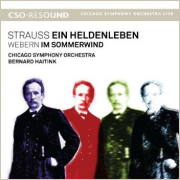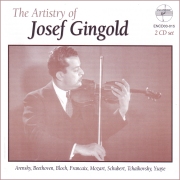My review of last night’s Saito Kinen Orchestra concert at Carnegie Hall is live at Classical Source.
Tag Archives: orchestra
Quick Take — Strauss: Ein Heldenleben / Haitink / CSO (CSO Resound SACD)
I’ve been a bit disappointed with the interpretive side of Bernard Haitink’s most recent concerts with the Chicago Symphony in Carnegie Hall, but remain mighty impressed by the quality of the orchestra. Under Haitink’s interim leadership between music directors Daniel Barenboim and Riccardo Muti (in tandem with Pierre Boulez), the orchestra remains one of the world’s greatest, and has even taken on a richer wind sound.
Continue reading Quick Take — Strauss: Ein Heldenleben / Haitink / CSO (CSO Resound SACD)
Mahler 8 — Gergiev / Mariinsky Orchestra et al @ Carnegie Hall
Performances of Mahler’s Symphony No.8 used to be a rarity anywhere; nowadays, hardly a season passes in New York City without at least one performance, this one being part of a series of Mahler concerts at Carnegie Hall featuring the Mariinsky Orchestra conducted by Valery Gergiev.
Orfeón Pamplonés and the Choral Arts Society of Washington dominated the present performance, and both of these solidly prepared ensembles’ unanimity of elocution and pitch, well-matched timbre, and stamina left a very strong impression, although there was a notable absence of a genuine pianissimo (let alone the double-pianissimo that opens the final choral section). The very fine Brooklyn Youth Chorus Academy sang with enthusiasm and excellent intonation, but were often overpowered by the grown-ups and had to resort to cupping their hands around their mouths to project a little more. A larger ensemble of children was needed; this was a serious miscalculation on the part of Gergiev.
One detail that did work was Gergiev’s decision to position the seven vocal soloists on the far left of the stage – and a selection of singers that was for the most part outstanding. The ensemble singing was satisfying, especially the women’s trio about two-thirds of the way through the second-movement “Faust” scene. I wasn’t so impressed with tenor Sergei Shimishkur’s – issues with his vibrato and intonation were a bit distracting – but his characterization of Doctor Marianus was on target. Anastasia Kalagina’s surprisingly warm soprano was excellently suited to the role of Una Poenitentium, and Alexei Markov’s Pater Ecstaticus was sung with the proper measure of passion and mystery.
It’s a pity I can’t be as enthusiastic about the Mariinsky Orchestra. Gergiev was using a smaller-than-usual string section (only seven double basses), but it was still able to deliver impressive louder passages without the least hint of edge. The strings have a warmer, deeper sound than one has come to expect from Russian orchestras, rock-solid ensemble and intonation, and stunningly precise pizzicatos. Principal violinist Kiril Terentyev played the brief solo melodies with incisive character and real beauty. It was all a marvel of gorgeous sound, and that was one of the largest problems: Mahler’s characterful music often calls for less-than-pretty sonorities, and everything coming from this orchestra was sumptuous – too much so. The string playing in particular (excepting the pizzicatos) was so legato-laden and smoothed-out that accents and strongly rhythmic passages were blunted. And the only true pianissimos were achieved at the beginning of “Faust” movement; all of the other quiet music was one or two dynamic degrees too loud. The woodwinds sounded a bit anaemic and sometimes buried in the texture, particularly in louder passages. Gergiev reined in the brass far too much, and the soft-focus articulation robbed too many passages of declamatory power. There were a handful of intonation issues in the horn section during the first movement.
Gergiev seemed intent on keeping the transitions in the opening ‘Veni Creator Spiritus’ smooth and efficient, which robbed the music of its rhetorical character. Sections of the second movement were a bit better delineated, but Gergiev’s willful failure to heed many of Mahler’s tempo instructions – not to mention a number of unsanctioned rallentandos, tempo shifts, and fermatas – was simply baffling.
The result was a performance that sounded more like a generic late-romantic cantata than the music of Gustav Mahler. Based on this disappointing performance, one could easily conclude that Gergiev has no feel – or respect – for this composer’s music.
Gustav Mahler: Symphony No. 8 in E-flat Major
Viktoria Yastrebova, Anastasia Kalagina & Liudmila Dudinova (sopranos: Magna Peccatrix, Una Poenitentium, Mater Gloriosa), Olga Savova & Zlata Bulycheva (mezzo-sopranos: Mulier Samaritana, Maria Aegyptiaca), Avgust Amonov (tenor: Doctor Marianus), Alexei Markov (baritone: Pater Ecstaticus) and Evgeny Nikitin (bass: Pater Profundus)
Orfeón Pamplonés
The Choral Arts Society of Washington
Brooklyn Youth Chorus Academy
Mariinsky OrchestraMahler
Symphony No.8
Viktoria Yastrebova, Anastasia Kalagina & Liudmila Dudinova (sopranos: Magna Peccatrix, Una Poenitentium, Mater Gloriosa), Olga Savova & Zlata Bulycheva (mezzo-sopranos: Mulier Samaritana, Maria Aegyptiaca), Avgust Amonov (tenor: Doctor Marianus), Alexei Markov (baritone: Pater Ecstaticus) and Evgeny Nikitin (bass: Pater Profundus)
Orfeón Pamplonés
The Choral Arts Society of Washington
Brooklyn Youth Chorus Academy
Mariinsky Orchestra
Valery Gergiev
Stern Auditorium, Carnegie Hall, New York City
Thursday, October 21, 2010
Valery Gergiev
Stern Auditorium, Carnegie Hall, New York City
Thursday, October 21, 2010
[Originally published at Classical Source]
Muti Cancels 2 Weeks of CSO Concerts Due to Illness
The Chicago Sun-Times’ Andrew Patner and NY Times’ Daniel Wakin file separate reports.
Pierre Boulez makes his MET debut
Details at Classical Source.
Orchestras Become Record Labels…
… and the Internet becomes a virtual concert hall. Daniel Wakin has the story and the links.
Apologies for the dearth of posts in the last two weeks; back up to speed soon.
Muti’s CSO Era Begins
Two major corruption scandals stun the classical music business
“Corruption scandals sully the LPO and the Salzburg Festival,” reads the headline to Charlotte Higgins’ latest article for The Guardian (UK). More than a few impressarios and managers must be starting to ask questions about the ease with which musical festivals and organizations are being looted.
Scandal at the LPO
The London Evening Standard reports on a scandal in the LPO’s head office: its finance boss allegedly siphoned off over half a million pounds. Ouch. (Hat tip: Jessica Duchen)
UPDATE: Jessica Duchen has a few things to say about the scandal.
Mystery Violinist Revealed
 The soloist is Josef Gingold; he is accompanied by the Ohio State University Symphony Orchestra conducted by George Hardesty in the finale of the Beethoven Violin Concerto, Op.61, recorded in 1963. The complete performance is on Enharmonic Records’ invaluable 2-CD set of performances drawn from Gingold’s own archive.
The soloist is Josef Gingold; he is accompanied by the Ohio State University Symphony Orchestra conducted by George Hardesty in the finale of the Beethoven Violin Concerto, Op.61, recorded in 1963. The complete performance is on Enharmonic Records’ invaluable 2-CD set of performances drawn from Gingold’s own archive.
{enclose 2009.myst.08.answer.mp3}

